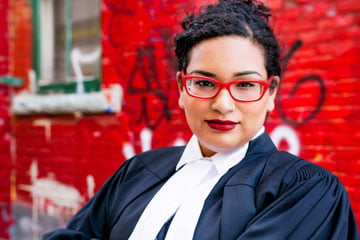Several candidates in the Law Society of Ontario’s bencher election say they will donate a sum of money for every ballot cast by a lawyer who was called to the bar in the past decade.

Several candidates in the Law Society of Ontario’s bencher election say they will donate a sum of money for every ballot cast by a lawyer who was called to the bar in the past decade.
Caryma Sa'd, founder and principal at the Law Office of Caryma Sa'd, who is running for bencher, says she is spearheading the campaign with fellow candidate Sean Robichaud, lead counsel and founder at Robichaud's Criminal Lawyers.
The pair announced on April 1 a new website, http://www.recentcallsvote.org/, advertising their platform. Several other candidates — Douglas Judson, E. Patrick Shea, Deepa Tailor and Billeh Hamud — have also pledged to donate a sum for every vote cast by a recent call. In addition to a donation to a charitable cause, the website says the named candidates will make “a commitment to advancing a recent call category of bencher.”
“The idea is: How do we get recent calls, who are a particularly underrepresented in terms of votes — which then translates into underrepresentation in terms of presence — how do we make them feel like their vote matters?” says Sa'd.
Sa'd says each candidate has chosen their own charity to patronize, including Canadian Civil Liberties Association, Cannabis Amnesty, Pro Bono Ontario, South Asian Legal Clinic of Ontario and Black Action Legal Centre. The amount each candidate is donating per vote ranges from five cents per vote to 20 cents per vote, the website says, summing to 75 cents per vote.
Voters do not have to reach out to candidates or prove they voted a certain way — Sa'd says the group will use the data released by the LSO after the election to determine the voter turnout in each age group. Sa'd says she isn’t sure if a similar initiative has been launched before but says there is no LSO rule prohibiting the donations.
The website, http://www.recentcallsvote.org/, did not, as of April 1, detail the positions of each candidate on issues such as law education, licensure or support for early-career lawyers. However, several of the candidates have individually spoken out on social media, advocating to help younger lawyers pay for robes, shrink law school tuition or for a designated bencher position for new calls. Sa'd says other candidates can join the initiative.
“We are open to anyone who wants to participate,” says Sa’d. “We have put out a call to action to candidates wanting to reform governance, to advance a position for recent calls, and are willing to commit to the charity action here. Naturally, it started with a few of us who had conversations along these lines.”
The bencher election ends on April 30 and will determine the board of directors that regulate Ontario’s lawyers. The election comes amid Convocation’s considerations of issues that affect young lawyers, such as licensure reform. Sa'd says the website is a culmination of long-running discussions about the importance of recent calls in the election.
In five Ontario bencher elections since 1999, the average bencher was licensed for 27.53 years, according to Professor Noel Semple, who published an article in the Canadian Journal of Law and Society in 2016. The LSO’s 2015 election results said that turnout was highest among lawyers born between 1951 and 1960, and the years of call most likely to vote in 2015 were between 1971 and 1990.
“The number of issues that directly impact recent calls — there are a ton — and to have no voice at all at the table is problematic. That’s why it’s been the focal point of this campaign. But, certainly, there are other demographics of lawyers who also would benefit from increased voter participation. This helps concentrate it on at least one group that can be reached,” says S’ad.









